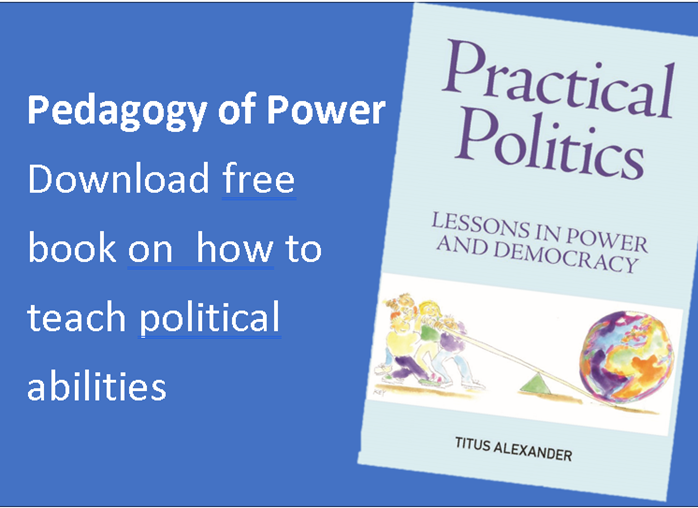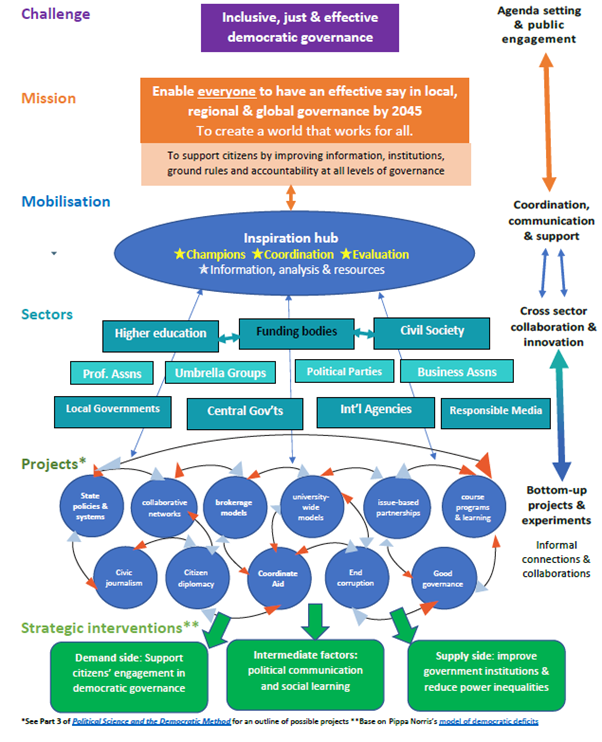The global crisis of democracy calls for concerted action to strengthen democratic governance everywhere. Dissatisfaction with democracy is widespread (see Global Satisfaction with Democracy 2020). Authoritarian rule is extensive, “characterized by increasing executive power, erosion of democratic norms, and a general tendency toward less freedom” (Democracy Report 2021). Decades of initiatives to promote democracy have failed to halt the rise of authoritarian, illiberal rulers.
Mariana Mazzucato’s Mission Economyprovides a powerful model to achieve big social goals: we need to used it to create a global mission for stronger, more effective democratic governance at all levels.
Many organisations advocate initiatives to strengthen democracy. The United States launched an ambitious Summit for Democracy and Year of Action in 2021, with a second summit in March 2023, with multi-stakeholder Democracy Cohorts working on key themes. The Center for American Progress has proposed a multiyear, multibillion-dollar Democratic Strategic Advantage Initiative, like the global fight against AIDS. Staff at the Carnegie Foundation urge “middle-power democracies” to employ five strategies to counter authoritarians. The Atlantic Council runs the D-10 Strategy Forum to promote concerted action for a “rules-based democratic order”. The Community of Democracies has a Five-Year Strategic Plan to address specific challenges. The Alliance for Securing Democracy published a 24-point strategy for democracies to “offset autocratic advances”.
Many citizens will be suspicious of state-led campaigns for democracy, so a global mission needs to be led by an independent coalition from across sectors and continents, such as:
- The Alliance of Democracies Foundation, Alliance for Securing Democracy, European Partnership for Democracy, European Democracy Hub, National Endowment for Democracy, National Democratic Institute, Electoral Institute for Sustainable Democracy in Africa (EISA).
- In higher education the Campus Compact, Democracy Commitment, Talloires Network and countless centres and scholars support and research democratic civic education and engagement.
- Civil Society networks such as CIVICUS, Citizens For Europe (CFE), the Transparency, Accountability & Participation Network, and many more (see UNDP report 2005, )
- Intergovernmental initiatives such as the International Institute for Democracy Electoral Assistance (IDEA), Community of Democracies and UN Democracy Fund, with civil society partners.
The challenges to democracy are powerful and widespread, so none of these are sufficient alone. To create an effective ‘mission for democracy’ we need
- Champions within organisations, civil society, higher education, governments and parties.
- Cooperation to coordinate actions, evaluate impact, share lessons and increase influence.
- Funding to facilitate cooperation and amplify impact.
A mission for democracy can learn from global initiatives for the Sustainable Development Goals, coalition against AIDS, Race to Zero climate campaign, Jubilee 2000 debt campaign, and an Oxfam study (2017). Pippa Norris’s model of democratic deficits provides a useful focus on three strategic areas to strengthen processes of democracy and the quality of governance to meet rising citizen expectations.
A role for higher education
Democratic governance is a permanent experiment in how to create a better world, peer reviewed by citizens through the ballot box, media and other scrutiny mechanisms. Social scientists could have a leading role in enabling citizens to be more effective by providing impartial information, analysis, education and support for civic engagement. Universities currently prioritise education for business (its biggest subject area), natural sciences and technology, but the world’s most difficult problems are social and political. My paper Political Science and the Democratic Method, textbook on Practical Politics: Lessons in Power and Democracy and short advocacy paper make the case for universities to increase education and support for citizens to make their social experiments better.
It just takes one well-connected person to create a coalition capable of launching a mission to make democracy the most effective, resilient model of governance in the world. Could it be you? Or do you know someone with the contacts, skills or position to make it happen?


